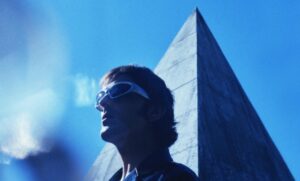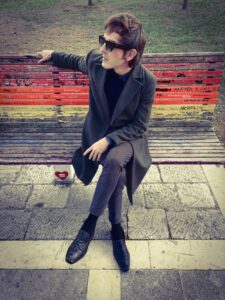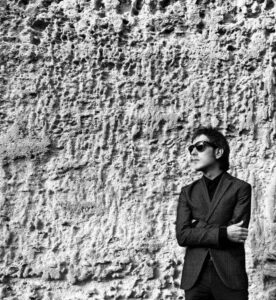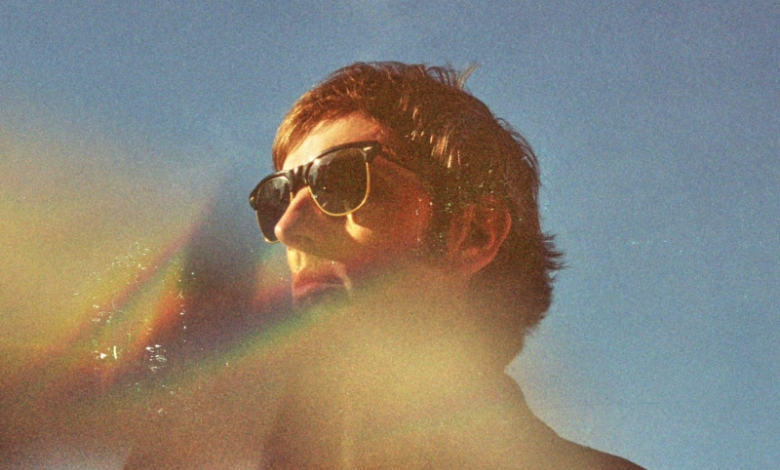Article index
Gianluca De Rubertis, the Hermeneuta of the human universe
"On that cooked moon skin/ on that beautiful girl's face/ I placed a candy/ with the hat with the bowler hat/ the moon cries arcane tears/ project the shadow of bat". These verses, so dark and mysterious, could be safely those of a lullaby sung by Count Dracula to a girl whose profile brings to mind Alice and her wonders.
 And instead, just like in the imaginable kingdom in which the famous dreamer of Lewis Carroll's stories is catapult, what becomes visible is nothing more than one of the doors open to the infinite routes of the unconscious.
And instead, just like in the imaginable kingdom in which the famous dreamer of Lewis Carroll's stories is catapult, what becomes visible is nothing more than one of the doors open to the infinite routes of the unconscious.
The verses in question belong to one of the most original signatures on the Italian panorama: Gianluca De Rubertis. Refined author and multifaceted musician in continuous experimentation that mixes with great taste and elegance the highest peaks of a symphonic pop in relation to the stars and the deep abysses of which the most fascinating, restless and epic songwriter was animated by the school of Genoa onwards .
Gianluca De Rubertis, a splendid vampire of the Italian song, is that ray of light in the cold shadow of which the need was felt; A visionary poet with a mysterious voice that, following the points of a sacred constellation made up of craftsmen of the word, language, phoné, has built a very personal and courageous style that challenges the cosmic nothingness of our (mal) times leading the listener towards other dimensions in which "between cascades of stars" it is possible to perceive the heat "of the light of Sirius, of the distant ones".
A pen in continuous impetus towards the unknown that oscillates between the glow of a chimera and the search to self-prevent itself. In 2012, after spending experiences in the musical group "Studedavavoli" and in the duo "Il Genio", he embarked on a solo path that leads him to the realization of three albums (self -portraits with objects, the elegant universe, the violence of light).
In 2024 the exit of his latest work is expected, a disc whose title still remains unknown but of which three tracks are already known that herald their atmospheres. Before turning attention to the interview, one must focus on one aspect: this exchange of jokes takes place shortly after the release of the single "Il Pellicano", a splendid fresco on childhood evoked by a pop aura that manifests itself through the sacred .
The song shows one of the natural elements that inhabit the inner cosmos of our traveler-author and who has always related to the external cosmos that lives it in: the sea. The waves of the sea, however, as Gianluca De Rubertis shows us in other songs, can also prove to be a terrible nightmare, becoming one with the dark sky of the night, the marine mirror of star shadows that manifest themselves as a gash on the death of the Thought and mix giving life to daughters images of the best expressionist cinema.
This other side of his poetics is perfectly linked to the idea of the double, of the infinity of "I" of which we are made; A mirror shattered in countless signifiers to be found in dreams and symbols capable of describing the dark side, one of all the pyramids.
In this interview developed on memories and mystery that carry, on the eternal, on the fear of darkness and on the search for an elsewhere, Gianluca de Rubertis guides us not only to discover his music but above all to discover ourselves, starting (Like his foam Salentino Carmelo Bene) from the farewell. That farewell that does not close the curtain but opens it on human existence.
"The Pellicano" is an immersion in memories whose flourish shows the passage of time externally but which through thought maintains its own flame on. From what memories did this "pelican" have fallen and what journey have you traveled for the realization of the song and the album in which it is part?
Look, as in ninety -nine percent of the cases of what I do, I think it is never a planned thing. The music came out almost instantly and the text also revealed itself in this way. I am one who works very quickly with the texts, except for rare cases.
It came natural to me to take a dip in some memory, starting from some images of when I was very young, and from there I followed a path that starts from early childhood and reaches the first loves, to the first comparisons with the bitterness that life involves, They are "the clouds that obscure the peaceful".
"The violence of light", the previous album, has been written over a few months, the latter will instead collect songs distant over time, written in different temporal moments. My way of writing, which is completely automatic as I said, unfolds in stealing the most immediate and sincere things.
The disc that will come out is written in a wider time, it will be made up of ten songs, including a cover of a piece by Riccardo Cocciante; It is a song that came back to me this year, in April, and that is part of my first memories of when I was a boy and the homemade parties were made, the lenses were danced. The song is "it was already foreseen", a song of love and pain, which I have transformed into something more current and danceable, I am really curious about how it will be welcomed. Speaking of the other songs, working on us, I realized which they were the ones who pawed, what they called me loudly; And I repeat there is no program.
It's always everything in making it. I'll tell you this: I had a musical idea for a year, I didn't get away, and I am one who does not force things, even when there is something I really like, maybe it's a twenty second cell, not the violent , because until the right appearance arrives.
One day I woke up at 6:00 in the morning and the song I was looking for in my head, just as it had to be, and so I immediately wrote the text on the notes of the iPhone within a quarter of an hour, then me I am re -admired.
I prefer that things come in this way instead of being there to study a precise road, also because the song form is similar to poetry and force the path of a poem I find it a little paradoxical, while forcing the road to large structures, such as In the case of novels, it can probably also prove to be necessary.
 Do you think that every listener through "The Pellicano" can get lost in the unknown territories of childhood by living his own flow?
Do you think that every listener through "The Pellicano" can get lost in the unknown territories of childhood by living his own flow?
I honestly don't know. I always say that every time the songs come out and are listened to are no more than us who write to them but they become a little of all and therefore I think it is also right that everyone sees inside the song what they want to see.
After all, when we listen to the songs we like we always see a bit what we want to see; If we asked the author the true meaning of what he wrote would perhaps remain disappointed, the feeling that the song gives us does not have to collide with what he tried who wrote.
It is more important that everyone feels their signifiers and that it transforms them into their own personal significant, that is the matter in the end. Moreover, we speak so much, but the speech made by talking is not pure understanding, but only interpretation.
Or what tries to be an interpretation ...
Exact.
I am very impressed by this song that he reads: "And that blonde child is still there that observes the depths of the sea". What relationship did you have with the sea and its sound? Did you scare you? And how much of all this did you report it in the song and in your present?
I was born in Lecce, so you know well that the sea is an essential matter there. Then I was lucky enough to pass all the summers in the beautiful family house to the sea, and therefore my relationship with it has always been strong.
In reality as a child the sea has always frightened me, to take the first dip from a meter of height I put a lot. I remember that for days I was thinking about it, but I could not take courage. That then this affair of the dive is very close to Carmelo Bene's "Lorenzaccio", to the act that erases the action.
I make an example: if you are on a ten-meter high rock and you are afraid of diving, to perform the gesture of the dip you have to de-think for a moment, otherwise you will never do it. It is true that Carmelo well is often accused of being cryptic or extremely brain in explaining these mechanisms but in reality he said a simply perfect thing, and it is also our task to transform in simple words what has been able to make us understand, it is this : To perform an act you really have to erase the thought for a moment, that's all.
A child on a ridiculous cliff half a meter high, for days to look at the waters of the sea, unable to make the jump. Then he dives, while the thought goes on vacation.
And at that moment you de-thought.
There de-life is necessarily. I am leaving Milan after 18 years, I go back to Lecce, I still find that the sea is a fundamental element, I like it a lot and I love to live it, despite also represents something frightening.
With the sea you have to know how to do it because it can also hurt you if you are not attentive, if you don't understand its being somehow relentlessly.
This thing is essential, which, among other things, I also reported in the song "Life is a dream" which is part of my 2015 album where I say in the refrain: “Like the dark night of the high sea/ like the Stars the sidereal space ", meaning the deep darkness of the sea as a universe, something unknown, which makes an immense fear and approaches a concept of necrosis, of death of thought, which is terrifying, but all this is inside of us.
The necrosis of thought or the thought of death are concepts inherent in living thought and are part of something unique and inseparable together with it.
Passing from the sea to the earth, in the song there is an extraordinary passage of writing that reads: "The icy oak in the austere park/ mother of children/ who know how to climb".
I was particularly affected by this oak that brings me back to Pinocchio, to the ENT of Tolkien or the Axis Mundi tree. Given your being a visionary singer -songwriter in which I know fairytale traits, what symbolism does this tree have inside the song? What role has it?
That is a real memory, because when I was little we often went to the Lecce municipal park, there was a gigantic oak. Among other things, Salento is an area where a particular oak breed is growing called "Vallonea" oak, it is a protected species.
That of the park was certainly very large, but I was a child to me appeared gigantic. I remember that my brother, bigger than me, climbed and I tried to reach him; So I have very beautiful memories about it.
In fact, then I didn't even think about these things even during the writing. I think, beyond my memories, the song traits of very simple things in which everyone can be reflected.
 You have called "the pyramids" a completely vertical song where the gaze ranges from earth to heaven, penetrating the backbone of an ancient millennial solid, up to the infinite universe of languages that float beyond the skies, new and unusual languages that for you They are life itself.
You have called "the pyramids" a completely vertical song where the gaze ranges from earth to heaven, penetrating the backbone of an ancient millennial solid, up to the infinite universe of languages that float beyond the skies, new and unusual languages that for you They are life itself.
What is the key to access to your mysterious, solar and electric pyramid?
"The pyramids" is a song that has to do with my theory of language, which derives from many things I have studied, including Carmelo Bene; For you, for me as for many, it proves to be a figure of great philosophical importance, it is a medium that gives access to thousands of things that you would not have known without him; Through him, a myriad of thoughts of others unravel, he managed to convey them in a suggestive and fascinating anti-thin.
So in "the pyramids" there is this vision of my language which in some way, for me, is also a visceral and sexual question; Orgasm is a form of de-life through which a new life can be created, because through it we can reach the act of fertilization. I have always thought of this peak as a time when a new language is created, as if there was a universal tank of languages still to come, which become possible every time a new brain lives this planet.
So it is as if by piercing each other, or by fucking in short, giving light new life did nothing but collect a portion of universal language that is ready to be cultivated there; The language is inexhaustible, we are eight billion but each person has a unique language that is impossible to replicate. In the song, all this speech then associated with the figure of the great pyramid of Giza, as a symbol of another face of language, the one that is not known not because it has yet to come but because it came and then lost. This song talks about unknown languages both past and future.
Then, at the bottom, to think about it, that of your speech on orgasm is perfectly part of the de-thinking from which something arises.
Exactly, the orgasm is Lorenzaccio, we are in an Aion that is only immediate, which perhaps is hungry in a universal tank of Infiniti Aion. In any case, there is the de-life, because we are not there with our heads.
Your solo path has led you to a symphonic pop that skilfully mixes songwriter and retro aesthetic with imaginative visions with a fresh flavor, sometimes futuristic even the result of science fiction readings, always maintaining a poetic melancholy veil. How do you enter the inner cosmos of Gianluca De Rubertis?
I believe that each of us is full of their thousands of doubles, just to stay with our beloved Carmelo, and with Artaud if you want, because outside we are one thing, but inside we contain infinite stimuli. Except that, as I said at the beginning, everyone believes herself alive in a single overall thought, has its own vision of things, and if you bring it with it.
As far as I am very brainy, I struggle to relax, I can also sink to a sofa saying: "Ah, how nice, now I don't do a fuck!" But the trouble is that I can't stop the thought.
To try to relax with chess play, journey with my head, making many questions, sidereal questions, cosmic questions (and in fact the word "universe" appears in many of my songs), are questions from which I have always been attracted.
I perceive the abysmal depth of the sea merge with the glacial one of the space in something unique, I feel billions of voices that scream, which come from all over this one, I feel a gigantic suffering that lives the human being; Sometimes I force myself not to think about it, because it destabilizes me. You know, this type of empathy can become very dangerous because when you are so in empathy with planetary, cosmic suffering, you have no respite.
In the song Canti: "And we are not moody because we are solar" but, I add, the trouble is that it happens to be lunar and go towards the darkness of the night.
But in fact I am more moody than sunny, widely. In the case of the song there is the imposing image of the pyramid that "forces" me to be sunny at that precise moment.
I find that your songs are full of metaphors that through the use of these wonderful images, such as that of the sea at night that becomes the mirror of the cosmic space and which gives the abstract idea of an expressionist film, you can transform music into poetry. How can you introduce us to your allegorical world?
I realize, but always after I wrote, that I have this symbolism you speak of and that is very strong. I often cite the moon, the universe, I think I have abused the sidereal word. It is a word that I find beautiful because it gives me the feeling of something unknown and icy and that at the same time resembles God, to a freezing diamond I dare to say, to an unknown object that stands out beyond good and evil.
So it is a symbolism that owns me in a completely natural way, I am the hermeneuta of myself. Specifically, the Pellicano is the symbol of simple things, those that are priceless, because you can buy what you want, but the memory of a roasted chestnut eaten with your mother is priceless.
"With the caresses of a love Pellicano" says the refrain, because the Pellicano is a Christian symbol and represents a love similar to AGAPE, an unconditional love that wants nothing in return, in short, a love that is neither erotic nor belonging , but it is simple, like what a man who observes a child feels and caresses him.
Reading many of your interviews and listening to your songs I perceive a strong connection with Battiato, as well as a not indifferent spiritual imprint. What relationship do you have with spirituality? And how does it manifest itself through your music?
I think I am a spiritual person. Then, like many of us in the trade, I belong to the breed of "Those cialtroni of the artists, sad pederast fighters" to mention Claudio Baglioni; We are very good at writing things they move, which lead to the essence of the human being, but then in reality in our everyday life we are also monsters on two legs, obscene things, indeed we are "so with two legs who do so much pain ”as Gozzano says.
So, personally, I beat myself and fight against myself, to try to be a better man than I am every day. You try. I believe that Battiato also fought this type of battle with himself, but I think he won it before many others. Returning to the principle of question, they are an extremely spiritual being and I am constantly doing questions, then being religious means, in fact, to ask questions. In this sense, Leopardi was a great religious, because through his writing he asks multiple and gigantic questions.
As you know, in theology, and it is sacrosanct, they only give questions, never answers. A response to any question of that caliber in turn contains other millions of questions that refer to the infinity, to the "raw light" of Tristan and Isolde, to that ice diamond I was talking about before. Even derridà in grammatology, in closed, comes to write: "The origins of language are perhaps to be found in theology". After hundreds, thousands of pages, the very erudite Derridà, the rational scholar, comes to this conclusion, is shocking.
What kind of dialogue do you have with the dark? I frequent it? Did you scare you as a child? I think of some of your songs as, in particular "I farewell".
I am afraid of the darkness, however not intended as darkness in itself, but as an unknowable magma from which it is impossible to escape, I am claustrophobic. The pito darkness makes me lose the orientation, it sends my brain into a jelly and surely this feeling in the songs pours out, despite being also a night animal, I have always lived at night.
The songs you are talking about are among my first soloists; But certain atmospheres will also return to the latter album through a song called "Dark Night". This dark night I am talking about is inspired by "The dark night of the soul" of San Juan de la Cruz. "Lucky night" I write, taking up the text of the dark noche.
The night, in reality, is the moment when a sort of rendering of accounts is made. You are lying, in a position that presages death. The darkness has to do with eroticism, with pain, with defeats, there is an extreme and gigantic sensuality I feel. They are a very sensual being, precisely from the point of view of the sensitivity of the senses.
For example, "I goodbye" is a song whose text was probably written in twenty minutes, because it arrived at the right time; Before writing it I was lying for days to look at the ceiling, I was looking for something, then one day I got up, I had the song ready, I can't tell you why. It is a song that speaks of a relationship with a woman, but the song also tells of the things never lived, in a mixture of reality and imagination, with the awareness that sensual love always loses, does not have a future, let's face it; Which is linked to the concept of darkness and the fact that I associate sensual and sexual love in the dark, to despair. I have always associated love with a sort of illness, then it is possible that it also lasts all life but it must necessarily transform into something else.
Passionate love is for me an ephemeral disease, fallen. Even in the album "The violence of light" there is a bit of all this, because the desperate research of a light is possible precisely because you are in a moment of great darkness. In my songs there is also the car-papier, that of Macbeth. I understood that in the songs I often make sure to self-beat myself, I write about things that scare me; It is nothing more than what we do as children, wanting to be frightened, and then we carry with it continuing to do it as adults.
From great the risk increases, perversion, but always that it is, and all this discourse I believe that we can associate it with what has been said before on Battiato and on that type of path, just think of his: "emancipate himself from the nightmare of passions ". That's all.
And of the dreamlike part that pervades many of the images you evoke? What weight do dreams have in your songs? Also, have you ever taken inspiration from your nightmare to write a text?
Therefore, some of my songs resemble nightmares, I think above all of "Lybachadabra". I confess that I have a very special relationship with the nightmare. I have been writing a sort of dreamlike intimate diary for years that is called "The Sognambulo", whose concept is a bit that of "The Canti di Maldoror", in which I write about many dreams I have made.
These are very strange dreams that I will never forget, some very frightening, mystical and absurd. So yes, I also put my part in the songs. I often scream during sleep. In recent years I have also made strange dreams concerning Franco Battiato .
Before or after his death?
Both before and after. This year I made one that struck me a lot. Afterwards I went to look for interviews, very interesting about it. I'm sure he really had an incredible energy.
There is a song of mine called "Pantelleria", written automatically, like many others I have told you about; I woke up at 6 in the morning with the words in my head, I was in Milo, on the slopes of Etna, in a house alongside that of Franco Battiato. I have dreamed of him numerous times, in the strangest ways, with very interesting dreams, full of symbols.
Instead, the encounter-clash between darkness and light?
I think this is always there in life. Let's say that, like a sound it spreads in the air, life spreads in the universe. A sound wave is made of ridges and depressions, and so also life, now we are on and now down, are necessary moments of life itself. It is a continuous transition between darkness and light.
However, we must see how we are aligned in the final moment, when you die, perhaps it is the most important thing. I would like to be aligned with the light, be ready. We must certainly look deeply, each of us should do it, even if around me I don't see this great desire to ask ourselves and above all to concentrate.
Maybe that's also why I don't have millions of listeners, because maybe I do something for which a concentration that not everyone has, I don't know, I am very concentrated, always, I don't always need.
Once in an interview you talked about the usefulness of art. How important is this uselessness?
It is fundamental. I believe, and perhaps I also said it in that interview, that the beauty of art is its uselessness. Why are the stadiums crowded with people? Because the fans want to see a memorable gesture, they want the piroetta, the great sporting gesture. That if you think about it this sporting gesture does not serve fucking, it has no social, humanitarian purpose, and for me this is art. When something is so useless then, perhaps, it is artistic.
Having in my hands "I appeared to the Madonna" of our beloved good I marked a couple of monumental and lapidary phrases that I would like to share with you to close the curtain of this interview, the first is actually a homeric quote: "And the gods gave Pain in humans was not lacking material to poets.
"The other, however, does this:" certain sunsets, it is true, they will no longer return, because as soon as the disenchantment teenager raises his confused face from the childhood floor, he already has the last sunset in his eyes. " What would you add to these maxims?
Everything is already written in these phrases that are goosebumps. It is true that without farewell nothing is done, also because birth is already a farewell. Every day we should say goodbye to the second that passes, to what we were doing.
Sometimes I say that nostalgia is a silly thing but then my sensual, sensitive being, leads me to feel that there are rivers of tears within me. We have been built in a formidable way, we are constantly looking for something, and this senseless research is the only thing that allows us to make sense, surviving us: farewell to yourself is the only way to start again. In "The Pellicano" there is certainly this nostalgic aspect, after all they are a sentimental.
Schiller makes a perfect distinction between naive artist and sentimental artist. I am certainly a sentimental. Schiller mentions among the naive Homer, to understand us, artists who describe nature with formidable ruthlessness and impartiality. The sentimental, like Chopin, are condemned to look at an infinite and wonderful sea, never have the courage to throw them inside.
So what is nostalgia? It does not concern the past, but the mystery, we cry for what we do not know. The naive, on the other hand, has the courage to throw himself into that open sea ... even if it is icy, even if it is scary.
Is childhood nostalgia for the eternal?
Yes ... and this beautiful question is already the answer. It is no coincidence that the old people look a lot like children, because we always return there and there is something that prepares us to death, to that passage that we hope can resemble a welcoming placenta. We don't know, this unknowable torment Ugo Foscolo, and we can add very little ...
Read also the article: the books that a facilitator should read








